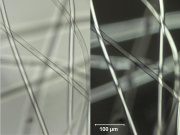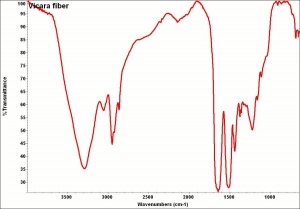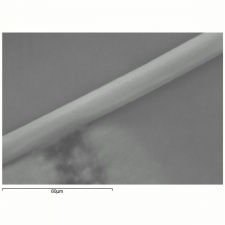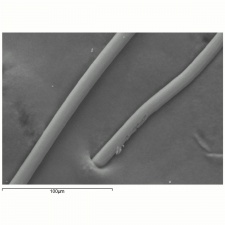Difference between revisions of "Zein fiber"
Jump to navigation
Jump to search
(username removed) |
|||
| (7 intermediate revisions by 3 users not shown) | |||
| Line 1: | Line 1: | ||
| − | [[File:Vicara 200X BF.POL.jpg|thumb|vicara fibers]] | + | [[File:Vicara 200X BF.POL.jpg|thumb|vicara fibers at 200x]] |
== Description == | == Description == | ||
| − | Regenerated [ | + | Regenerated [[protein%20fiber|protein fibers]] made from corn and maize. Zein fibers were commercially sold as Vicara from 1948 to 1957. They were made with the crushed meal of corn and maize after the oil was extracted. The meal is dissolved in an alkali bath then forced through spinnerets to form fine fibrils that were hardened with [[formaldehyde|formaldehyde]]. Fabric made from zein fiber is soft, tough and strong and has the warmth of wool. It is resistant to mildew, insects, sunlight, and temperatures to 140 C. Vicara was usually blended with [[cotton|cotton]], [[wool|wool]], or [[rayon%20fiber|rayon]]. It was used in suits, sweaters, blankets and pile fabrics. |
| − | |||
== Synonyms and Related Terms == | == Synonyms and Related Terms == | ||
zein fibre; Vicara [Virginian-Carolina Chemical] | zein fibre; Vicara [Virginian-Carolina Chemical] | ||
| − | [[[SliderGallery rightalign|vicara1000m.jpg~SEM|vicara500m.jpg~SEM]]] | + | [[[SliderGallery rightalign|Vicarafiberkj1.jpg~FTIR|vicara1000m.jpg~SEM|vicara500m.jpg~SEM]]] |
| − | == | + | == Risks == |
| − | + | * Does not burn easily. | |
| − | + | == Physical and Chemical Properties == | |
| − | |||
| − | |||
| − | |||
| − | |||
| − | |||
| − | |||
| − | |||
| − | == | + | * Soluble in hot alkaline solutions |
| + | * Insoluble in water, dilute acids and most organic solvents | ||
| + | * Fibers are smooth with a circular cross section | ||
| + | * Tenacity = 1.2 g/denier (dry); 0.65 (wet) | ||
| + | * Elongation 25-35%; (wet); 30-45% (dry) | ||
| + | * Moisture regain = 10% | ||
| + | * Melting Point = 185 (dec) | ||
| + | * Density = 1.25 | ||
| − | + | ==Resources and Citations== | |
| − | + | * Hoechst Celanese Corporation, ''Dictionary of Fiber & Textile Technology'' (older version called Man-made Fiber and Textile Dictionary, 1965), Hoechst Celanese Corporation, Charlotte NC, 1990 | |
| − | + | * Rosalie Rosso King, ''Textile Identification, Conservation, and Preservation'', Noyes Publications, Park Ridge, NJ, 1985 | |
| − | |||
| − | |||
| − | |||
| − | * | ||
| − | |||
| − | |||
* ''Fairchild's Dictionary of Textiles'', Phyllis G.Tortora, Robert S. Merkel (eds.), Fairchild Publications, New York City, 7th edition, 1996 | * ''Fairchild's Dictionary of Textiles'', Phyllis G.Tortora, Robert S. Merkel (eds.), Fairchild Publications, New York City, 7th edition, 1996 | ||
| − | * | + | * J.Gordon Cook, ''Handbook of Textile Fibres:II Man-made Fibres'', Merrow Publishing Co., Durham, England, 1984. p.141. |
[[Category:Materials database]] | [[Category:Materials database]] | ||
Latest revision as of 09:46, 6 June 2022
Description
Regenerated protein fibers made from corn and maize. Zein fibers were commercially sold as Vicara from 1948 to 1957. They were made with the crushed meal of corn and maize after the oil was extracted. The meal is dissolved in an alkali bath then forced through spinnerets to form fine fibrils that were hardened with Formaldehyde. Fabric made from zein fiber is soft, tough and strong and has the warmth of wool. It is resistant to mildew, insects, sunlight, and temperatures to 140 C. Vicara was usually blended with Cotton, Wool, or rayon. It was used in suits, sweaters, blankets and pile fabrics.
Synonyms and Related Terms
zein fibre; Vicara [Virginian-Carolina Chemical]
Risks
- Does not burn easily.
Physical and Chemical Properties
- Soluble in hot alkaline solutions
- Insoluble in water, dilute acids and most organic solvents
- Fibers are smooth with a circular cross section
- Tenacity = 1.2 g/denier (dry); 0.65 (wet)
- Elongation 25-35%; (wet); 30-45% (dry)
- Moisture regain = 10%
- Melting Point = 185 (dec)
- Density = 1.25
Resources and Citations
- Hoechst Celanese Corporation, Dictionary of Fiber & Textile Technology (older version called Man-made Fiber and Textile Dictionary, 1965), Hoechst Celanese Corporation, Charlotte NC, 1990
- Rosalie Rosso King, Textile Identification, Conservation, and Preservation, Noyes Publications, Park Ridge, NJ, 1985
- Fairchild's Dictionary of Textiles, Phyllis G.Tortora, Robert S. Merkel (eds.), Fairchild Publications, New York City, 7th edition, 1996
- J.Gordon Cook, Handbook of Textile Fibres:II Man-made Fibres, Merrow Publishing Co., Durham, England, 1984. p.141.



